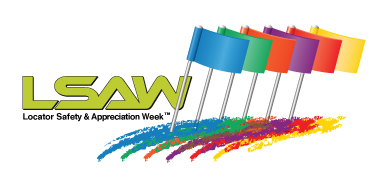
Locator Safety & Appreciation Week (LSAW) is a celebration of utility locators’ hard work and an acknowledgment of the hazards they face every day in the field. Locators play crucial and often underappreciated roles in protecting the public and our underground infrastructure. Take some time this week to thank a locator in your life! We’ll be sharing locator safety content throughout the week to spread awareness of the difficult work they perform. Learn more about LSAW and how to participate at locatorsafety.com.
Locator Safety Hazard: Threats to the Eye
Over 2,000 U.S. workers each day sustain a job-related eye injury that requires medical treatment, according to the CDC. More than 100 of those injuries lead to one or more days away from work. Locators may seem unlikely to be at high risk for eye injuries, but they’re common enough to rank in the top ten hazards locators face on the job.
Eye threats include:
- Debris kicked up by passing vehicles, which can include anything from roadside nails to slivers of wood, instantly become dangerous projectiles if locators are in the immediate area.
- Dust, disturbed while a locator works in a confined space, can irritate the eye.
- Strain and possible damage from sun exposure.
To best avoid common eye threats:
- Wear appropriate PPE. Safety spectacles protect the eyes from impact damage, such as flying fragments. Full goggles can be utilized if floating dusts are a concern. Sunglasses provide protection from UV damage, as do most polycarbonate safety glass lenses.
- Stay alert for passing vehicles, especially when working near a roadway with debris.
- Educate the public on the dangers of passing roadside workers too closely and at speed.
If an eye injury does occur, seek medical attention and avoid these common reactions:
- Avoid squeezing the eyes shut.
- Don’t attempt to remove anything embedded in the eye. Corneal abrasions, or scratches, can feel like an obstruction in the eye. If rubbed, scratches can become significantly worse and cause long-term damage.
Comments